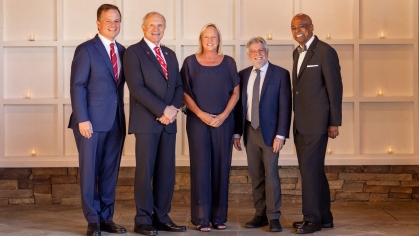A Century of Memories
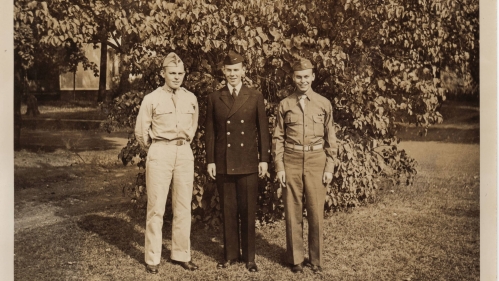
A Rutgers University graduate from the Class of 1948 who is turning 100 cherishes his memories of Rutgers and much more.
Bob Archibald enjoys regular video chats with his 11-year-old great-granddaughter. “It’s amazing how many questions little kids can ask,” says Archibald, who was born in 1923 and will turn 100 on December 18.
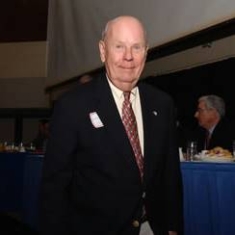
Archibald says their topics run the gamut, such as what he did when he was a boy, how much things cost, and more. “Usually, I end up telling her that in those days, a good horse was more than a Model T,” he says.
Archibald, a native of New Jersey who lives in North Palm Beach, Florida, comes from a Rutgers family. His father, Lauren Sinclair Archibald, was a 1917 Rutgers graduate and World War I veteran who attended school with Paul Robeson.
His father returned to Rutgers as a professor in the late 1920s, and sent all three of his sons to the university in the late 1930s and early 1940s. “I had really great parents,” he says. “I’ve often wondered as I think back what it was like for them to have all three of their boys go into World War II.”
Archibald knew—and his father was close to—Selman Waksman, a Rutgers class of 1915 alumnus and scientist who later taught at Rutgers and led development of treatments for tuberculosis and streptomycin, feats that earned him the 1952 Nobel Prize in Medicine. The family also was close to Robeson. “We saw every performance he gave at Rutgers,” Archibald says. Archibald vividly remembers being a child and seeing Robeson perform “Old Man River,” saying, “What a beautiful voice he had.”
Archibald was a high school senior when Pearl Harbor was attacked. “When it happened, I thought, ‘Oh, gee, I’m too young,’” he says. “‘The war will be over before it was time to go in.’”
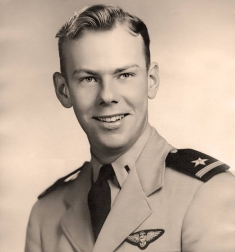
He enrolled at Rutgers in the fall of 1942 but enlisted in the Navy that December, setting his sights on becoming a pilot. He was called up in June 1943, and went through almost two years of often dangerous flight training to earn his wings on May 1, 1945. He described it as the “proudest moment of my life. I think without a doubt it was the hardest thing I’ve ever done.”
Archibald was not deployed overseas before the war ended later that year. His middle brother, John, served on the home front as a statistician for the Army Air Force. His oldest brother, William, served in the Army and fought in a number of invasions in the Pacific, including Iwo Jima and Okinawa. William remained in the Army, rising to the rank of brigadier general.
After the war, Archibald returned to school in New Brunswick. “The best thing that ever happened to me at Rutgers was I met my wife,” he says. He and Wilma VanderMay, a 1946 Douglass College graduate, were married for 68 years. They raised three children. She died in 2016 at the age of 91. Archibald now has 10 grandchildren and 10 great-grandchildren.
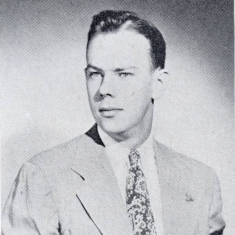
After graduating with a business degree in 1948, Archibald went into the laundry business but eventually became a stockbroker and business investor. He and his family lived in North Caldwell, New Jersey, and Essex Fells, New Jersey. He remained active in aviation, owning airplanes and continuing to fly into his eighties.
He moved to Florida part-time in 1991 and lived a snowbird lifestyle with a home in New Jersey until his wife died, after which he made North Palm Beach his permanent home.
Archibald and his brother, John—who died in 2020 shortly before turning 99—supported the Rutgers Oral History Archives, and both served on the Rutgers Living History board. John participated in an oral history interview in 1999, and Archibald sat for an in-depth interview in 2005.
Archibald says he regrets that his brother William, who died in 1998 at the age of 77, never got to do an interview for the Rutgers Oral History Archives. He says William, in addition to his Army service, fulfilled important assignments with the Navy and Marines during the war, including being in the first group of Americans to go into Hiroshima after the atomic bomb attack. “He had probably one of the most unique experiences of any guy in the Army,” Archibald says.
As his landmark birthday approaches, Archibald continues to go to the gym to exercise three days a week. He recently researched online to find out how many Americans have reached the age of 100. “I never thought I’d live to be a hundred years old,” he says, “but just for the heck, I pulled it up on Google.”
He found that in 2021, there were 89,739 people who had reached centenarian status in the U.S.—a miniscule .02 percent of the population. “There aren’t many of us left,” he says.
Archibald says he is looking forward to celebrating his 100th birthday with family. “I’ve really had a blessed life,” he says.
